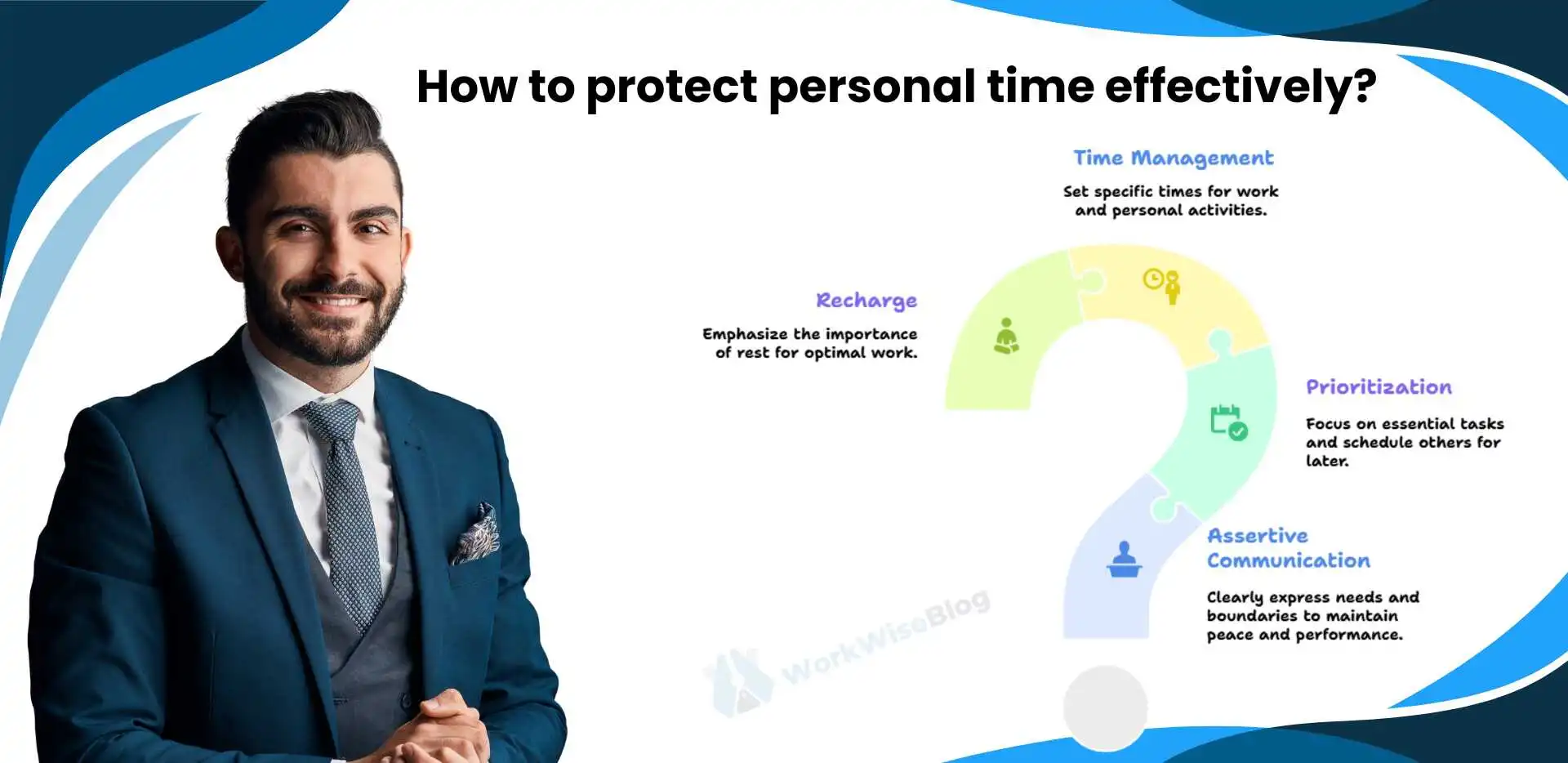Table of Contents

What is Time Management?
Before stepping into the interview room, ensure you have a deep understanding of the role. Study the job description carefully to identify:
- Key responsibilities.
- Required skills and qualifications.
- Performance expectations.
Example: Should you be seeking a marketing position, talk about the challenges you have faced successfully where the goals were compatible with those of the company, for example increasing the website’s traffic by 40% in one year.

The Role of Time Management in Career Success
Your career can be built or destroyed by time management practices and strategies. You will be able to get closer to your professional goals because of your enhanced ability to manage time. In this regard, let us look at how effective time management helps achieve success in one’s career:

1. Increases Productivity
Given an efficient time management system and style, you will achieve a lot with little time taken. This implies you will meet required targets, perform several activities, and maintain quality over quantity. Since productivity is an observable whether it is output in numbers or quality, it becomes essential in career growth and change.
Example: A manager will get promotions because their perception has been developed over the years where they always complete tasks and obey deadlines.

2. Enables Better Decision-Making Skills
Management of tasks in the most strategic manner is carried out with the purpose of allowing time for sound decision making to occur. Proper scheduling aids in anxiety and stress reduction, which subsequently affects judgment and decision making abilities positively.
Example: A trained professional who has more demanding tasks to handle on that particular day is unlikely to hurry through their decisions as they already have a plan in mind.
3. Enhances work life integration
Proper time management enables you to reserve time not only for your work, but also for other activities outside work. There is a need to balance career and personal life for any person to be successful in the long run. Time management allows you to set limits on your work so that it does not take over your free time.
Example: A software engineer who exercises control over his time may get his tasks completed before the deadlines and go home at a reasonable hour so that he can spend time with his family or go for his personal activities.
4. Builds career prospects
Time management in this case is also related to one’s professional image. The ability to be on time, plan, and follow schedules speaks volumes about one’s ability to manage their time. These characteristics are recognized by colleagues and managers, which can pave the way for career promotion.
The Psychology Behind Time Management
Time management is not only a technical activity but also has its own share of psychological depth. Studies have shown that if someone can manage their time properly, their mental focus, stress, and cognitive capacity can be increased.
Such cognitive load can be avoided when there is knowledge of what must be accomplished during each day. Greater mental understanding allows for better problem-solving, creativity, and decision making.
Essential Time Management Skills for Career Success
In order to achieve success in your profession, developing time management skills is of utmost importance. Here are a few simple time management strategies you can use to enhance your productive stamina at work:
1. Prioritization
One of the basic time management techniques is learning to discriminate between tasks and prioritize them. The Eisenhower Matrix is a widely used quadrant to achieve this. It helps to sort tasks in one of the four categories. Here are they:
- Urgent and important
- Not urgent but important
- Urgent but not important
- Neither urgent nor important
By putting out fires in the most urgent and important tasks, you make sure that the most important work is accomplished in the expected timeline.
2. Task Delegation
It is particularly essential to focus on mastering the art of giving assignments and responsibilities to ensure career advancement. If you feel like you have to do everything by yourself then more chances are that you will become exhausted. Delegating responsibilities allows you to do what’s most important while others do the rest.
Example: In this way, a project manager can pass on day-to-day chores to members of the project team so that they focus on the crucial components of the project such as planning and leadership.
3. Avoiding Procrastination
The habit of procrastinating has the potential to impede your career advancement. It can be dealt with by dividing activity into smaller sized pieces. The Pomodoro Method of working for 25 minutes followed by short breaks is a solution to this by enabling focus and keeping procrastination to a minimum.
Time Management Tools and Resources for Professionals
As we enter the digital phase of humanity, many resources are available to enhance time management. A few beneficial ones include the following:
- Trello: A project management tool for visual task management.
- Notion: An all-round workspace where one can take notes, manage tasks, and plan projects.
- Google Calendar: A very simple tool for scheduling meetings and reminders.
- RescueTime: A time-tracking tool that allows you to see how your time is being spent.
The Connection Between Time Management and Career Planning
How well you manage your time can have a bearing on your career evolution. Time management is an essential skill for any professional hoping to achieve a career advancement or a better paying job in a new position.
Example: If a content writer was able to organize their work and set certain periods for research, writing, and editing, he or she is likely to produce better articles. This leads to faster career growth within the field in question.
Time Management Mistakes to Avoid
Nevertheless, many businesspeople are gaffe-prone in balancing their time. Here are a few blunders that should be avoided
- Over-scheduling: Over-commitment usually results in over-exertion and mental fatigue.
- Avoiding Breaks: No breaks entail negative productivity and a state of being worn-out.
- Severe Time Management: This means that you are not open to any sudden shifts or changes that may occur during the course of activities.
Practical Time Management Tips for Career Advancement
Here are some tips you can use to improve your time management skills:
- Use the 2-Minute Rule: If the task at hand can be completed in under two minutes, go ahead and do it.
- Batch Similar Tasks: Try to focus on the more important tasks first and complete them to save time.
- Create a Morning Routine: Setting a morning routine can help you prepare for a busy day ahead.
Case Studies and Real-Life Examples
Case studies can help understand how good time management can bring about success in one’s career. For example, Elon Musk, the chief executive officer (CEO) of Tesla and SpaceX, is reputed for being extremely organized regarding time management method called timeboxing. To accomplish this, Musk uses a highly complex method that breaks his day down into five-minute intervals where tasks are performed. As a result, he manages to run several companies efficiently.
Here you can read more Elon Musk’s ‘Timeboxing’ Method to Manage Time Effectively
Conclusion
By learning how to focus on important tasks, avoid distractions, and plan your day wisely, you can get more done while feeling less stressed.
The secret isn’t about controlling time itself but about managing how you use it. Start with simple steps: set clear goals, use a planner or app to track your progress, and learn from any mistakes.
These small changes can help you build a career that feels balanced and fulfilling.
Remember, how you spend your time shapes your future. Take charge today, and see how it transforms your journey. To learn more about improving your time management skills, check out resources like Vati.io for expert tips and insights.
FAQs
How Does Time Management Help in Career?
Prospective employers, or anyone interested in advancing or hiring you, will also appreciate your formal work habits and style. In particular, the completion of tasks allocated within a prescribed time frame, which helps avoid the situation of last minute work. Ultimately, Confident in being able to deliver quality results, less frantic endeavors take place which is in the best interests of your work’s reputation and output.
How Does Time Management Help in Achieving Success?
Time, the great essence of all things, helps you in management of processes and resources. It allows the most relevant tasks together with time constraints to be completed systematically, beginning with the most relevant ones. This maximizes the chances of success. With everything planned in such an organized manner, the tendency to hurry unnecessarily regarding any single effect becomes watered down and eventually ceases to exist.
How Important is Time Management in Your Job?
In terms of how management of time aids an individual, the focus with regard to the time that is consumed looking into a given task at hand invariably determines the extent of productivity. Efficient time management not only assists in completion of assigned tasks, but creates space for you to reach out to significantly bigger tasks. A step towards achieving the impossible.
What is the Role of Time Management in Academic Success?
Time management, for learners, is an important aspect in transforming disorganized routines into calculated ones and ensuring that set deadlines are intimidatingly met on all occasions. This allows students to concentrate and be active, creating a conducive environment for their achievement.













